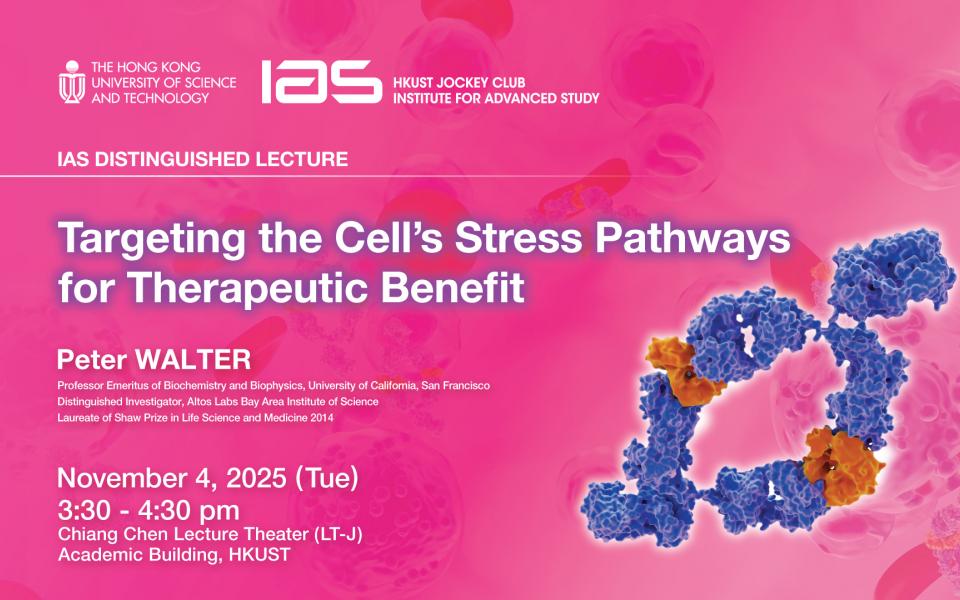IAS Distinguished Lecture - Targeting the Cell’s Stress Pathways for Therapeutic Benefit
Supporting the below United Nations Sustainable Development Goals:支持以下聯合國可持續發展目標:支持以下联合国可持续发展目标:
Abstract
From its birth in the cradle of the ribosome to its demise in the fangs of proteolytic enzymes, a protein continuously explores different folding states. In most cell compartments, molecular sensors carefully monitor protein folding and instruct downstream effectors to take corrective actions as needed. In response, cells can make adjustments to their protein folding and degradation machineries to stay in a healthy state of homeostasis. If protein folding defects occur and cannot be corrected in a sufficient and timely manner, cells induce suicide programs. Programmed cell death is thought to protect an organism from malfunctioning rogue cells that result from an accumulation of defective protein. In various pathologies, the life/death balance can inappropriately err on either side: killing cells that would be beneficial if kept alive or, alternatively, inappropriately protecting dangerous, disease-propagating cells. Studies of the regulation of proteostasis now emerge as focal points of foundational basic research that powerfully connects to a broad spectrum of unmet clinical needs. The speaker will discuss advances in their lab’s efforts to understand the molecular details of the unfolded protein response (UPR), a conserved signaling network that surveys the protein folding status in the endoplasmic reticulum. The UPR signals through three molecularly distinct branches. The development of small, drug-like molecules that selectively target each of the UPR’s signaling branches has opened promising new therapeutic opportunities in areas as divergent as cancer, neurodegeneration, diabetes, inflammation, aging, and cognition. As such, the UPR emerges as a prime example of the power of fundamental cell biological discoveries to address problems of immense societal impact.
About the Speaker
Prof. Peter WALTER graduated from the Free University of Berlin in 1976, received his MS in Organic Chemistry from Vanderbilt University in 1977, and obtained his PhD in Biochemistry at The Rockefeller University in 1981. He was an Assistant Professor at The Rockefeller University in 1982, and joined the Department of Biochemistry and Biophysics at the University of California, San Francisco (UCSF) in 1983. He moved up through the ranks and served as Department Chair from 2001 until 2008. He is currently a Professor Emeritus at UCSF and a Distinguished Investigator at the Altos Labs Bay Area Institute of Science. He was a Howard Hughes Medical Institute Investigator until 2022.
With a particular focus on the endoplasmic reticulum, the organelle in which many newly made proteins are assembled, Prof. Walter’s lab uncovered the “unfolded protein response”, a complex cell-internal signaling network that adjust the cell’s protein folding capacity to demand. Regulating the abundance of the endoplasmic reticulum is a fundamental process for all eukaryotic cells, and it is a key determinant for any number of diseases, including cancer, diabetes, and neurodegenerative diseases. Most disease connections arise because the cell is programmed to die, rather than putting defective and potentially harmful proteins on its surface. His lab has identified the genes that are centrally involved in the unfolded protein response and deciphered their function in this crucial cell-internal communication pathway.
Prof. Walter’s contributions to science have been recognized with many distinguished awards, including the 2014 Shaw Prize in Life Science and Medicine, the 2014 Lasker Award, 2015 Vilcek Prize in Biomedical Science, and the 2018 Breakthrough Prize. He is the 2016 President of the American Society of Cell Biology and an elected member of several prestigious scientific societies such as the German Academy of Natural Scientists Leopoldina, the US National Academy of Sciences, the US National Academy of Medicine, the American Association for Arts and Science, and the European Molecular Biology Organization.
For Attendees' Attention
Seating is on a first come, first served basis.
